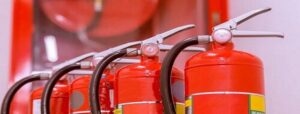Fire Extinguisher Classes and Safety Tips
Fire has been one of the most momentous discoveries of mankind, yet it can also be a great menace if overlooked. Fire safety should be considered paramount in every building, particularly for owners responsible for their workers’ safety. Compliance with fire and safety regulations is crucial to maintain staff security and premises integrity. Regardless of the type of business or number of employees, fire protection should always take priority. Ignoring necessary fire safety measures can result in a catastrophically weakened building structure and severe injury in the event of an emergency. Get in touch with dependable fire and safety companies companies in Abu Dhabi for an all-inclusive suite of fire protection services.
The first line of defense against small fires in most buildings is fire extinguishers. While sprinklers, alarms, and other fire safety devices are necessary for certain occupancies only, portable fire extinguishers are needed for each company. Fire extinguishers play an important part in the prevention and mitigation of fire-related accidents in case of fire emergencies. It’s not just prudent to keep fire extinguishers at home, it’s the rule in many places as well.
It’s necessary to make certain that you have the correct type of fire extinguishers available to fire anywhere.
Fix a Fire Extinguisher
When you choose a fire extinguisher, firstly, you have to determine which rooms are necessary in your home or workplace. At least one should be kept in your house on each floor. Make sure you keep fire extinguishers practical where fires like in the kitchen and garage are more likely to begin.
Classes of Fire
Fire extinguishers are intended to deal with the different kind of fire types. There are six different fire classes and various fire extinguishers.
Class A: Fire caused by Solid-fuel fires, such as those involving wood, paper, or textiles.
Class B: Fires caused by flammable liquid fires, such as gasoline, diesel, or oils
Class C: Fires occur due to gases.
Class D: Fires occur due to metals.
Class E: Fires caused by live electrical equipment.
Class D: Cooking oil flames, such as those in deep-fat fryers.
Choose the Right Type of Fire Extinguisher
Water extinguishers
Water extinguishers are one of the most cost-effective ways to put out Class A fires, which are those that are started with solid materials like paper, wood, or textiles.
Foam extinguishers
On Class A and B fires, foam fire extinguishers may be used. They’re best for putting out liquid fires like gasoline or oil, but they’re more flexible than water jet extinguishers because they can even put out solid fires like wood and paper. Liquid fires are extinguished by foam by covering the liquid’s surface, preventing flammable vapor from touching the air and robbing the fire of fuel. They cannot be used on free-flowing liquid fires.
Powder extinguishers
Powder extinguishers are versatile fire extinguishers that can be used to put out Class A, B, and C fires. They can also be used to put out fires caused by electrical appliances, but they do not cool the fire down enough for it to re-ignite. Powder extinguishers can also reduce visibility and cause breathing difficulties. They are usually not recommended for use within buildings unless there is no other choice.
Carbon dioxide extinguishers (CO2)
CO2 extinguishers are safe to use on fires involving electrical apparatus, they are suitable for areas with a lot of electrical equipment, such as offices or server rooms. Unlike foam extinguishers, carbon dioxide extinguishers do not leave any residue. They can also be used to put out Class B fires, which are those that include flammable liquids like paraffin or gasoline. CO2 extinguishers put out fires by suffocating them and cutting off their oxygen supply.
Wet chemical extinguishers
Class F fires involving cooking oils and fats, such as lard, olive oil, sunflower oil, maize oil, and butter, can be put out with wet chemical extinguishers. When used correctly, they are extremely powerful. The wet chemical quickly extinguishes the fire, cools the burning oil, and reacts chemically to create a soap-like solution that seals the surface and prevents re-ignition. While they are mainly intended for use on Class F fires, cooking oils, and deep fat fryers, they may also be used on other types of fires. They can also be used on Class A and Class B fires (wood, paper, and fabrics) (flammable liquids).
Fire Blankets
Fire blankets are designed to be used on hot oil fires, such as those found in frying pans or small deep fat fryers. They can even be used to put out a fire in someone’s clothes. They work by suffocating the fire, cutting off the oxygen supply that fuels it, and finally extinguishing it.
Get your Fire Extinguisher today
Fireman Safety Qatar and Abu Dhabi offer a wide range of highly specialized fire extinguishers to suit your specific needs. Our experienced specialists are available 24/7 to test, install, and inspect the required fire extinguishers anywhere in UAE. Trust Fireman Safety for your fire extinguisher needs, now that you have determined the appropriate quantity and types. Look for lightweight fire extinguishers that are easy to handle. While larger extinguishers provide greater strength, proper usage is essential. Rely on reputable fire and safety companies in Abu Dhabi for optimal fire protection solutions and services.

